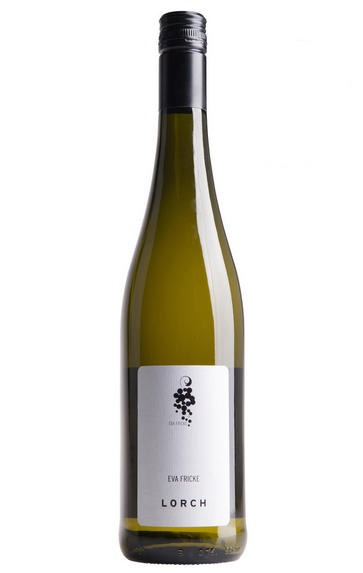
About this WINE
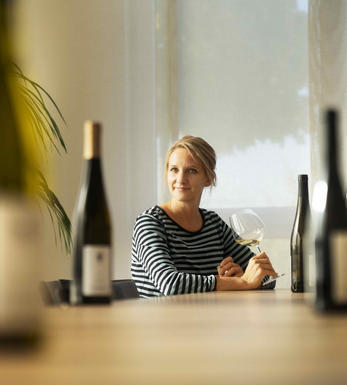
Eva Fricke
Eva Fricke has been crafting laser-focused dry Rieslings from the small town of Eltville since 2011. In short order, she has established a reputation as one of the finest producers in the Rheingau. After completing her studies at Geisenheim University, Eva took the winemakers’ grand tour – gaining experience in Australia, Bordeaux, Piedmont and Ribera Del Duero. Drawn to the Rheingau, she became the winemaker at Weingut Leitz.
In 2006, Eva started to make her own wine as a side project, starting with less than 0.25 hectares. Over the next six years, she leased and purchased enough vineyard to leave Leitz and strike out on her own. From her small beginnings Eva has now built a portfolio of 17 hectares of vineyards.
In creating her single-vineyard wines, her goal is to demonstrate the personality and individuality of the Rheingau. Seeing her responsibility as not only re-establishing the Rheingau’s past position in Germany’s top tier but to elevate it to new heights.
As an introduction to Eva’s wines, the Rheingau Riesling is a blend from several Rheingau vineyards in Lorch, Eltville, Hattenheim and Kiedrich. This comes from a full cross-section of the Rheingau’s soils: sandy loess and loam, clay and alluvial, slate and quartzite. The sand, loam and clay contribute to more fruit-forward wines. The slate and quartzite found in the vineyards of Krone and Schlossberg imbue her single-site wines with a linear, saline quality.
From the outset, Eva has been committed to organic and biodynamic methods of farming, believing not only in the environmental benefits but also that it allows more expression of terroir.
Wherever you see Eva’s wines described you will find the same adjectives: tingly, vibrant, filigreed, intense. It’s therefore no surprise to find that the winery is devoid of old wooden vats and instead gleams with stainless steel.
In keeping with Eva’s low-intervention philosophy, fermentation is spontaneous and kick-started with native yeasts. Her wines will spend anything from 4-10 months on their fine lees, gathering weight and complexity and fixing the freshness firmly in place.
The Rheingau Riesling may be Eva’s entry level, but it is by no means an entry-level wine. It’s a masterclass of purity and balance, a perfect marriage of ripe fruit and flinty minerality.
Eva describes the Krone and Schlossberg as her Grands Crus. While this is not a legal term in Germany it is easy to understand the context: Krone’s 70-year-old vines arranged on grey slate with a limestone sub-soil produce a wine of miraculous expression which dances out of the glass. The vines of Schlossberg’s warmer site are more venerable still, planted in the 1930s and ’50s.There’s no shortage of Eva’s trademark precision here, but it overflows with generous, exotic fruit.
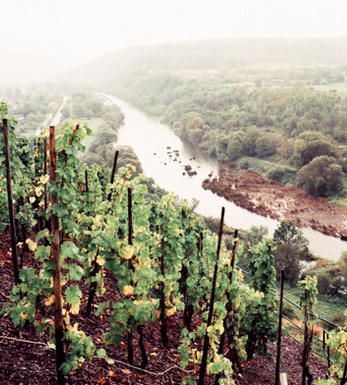
Germany
The 102,000 hectares of German vineyards produce some of the world’s greatest white wines from the Riesling grape. With a run of excellent vintages, top estate wines are at long last fashionable, with Riesling finally getting the acknowledgment it deserves. Its touch of sweetness is underpinned by a racy acidity and a fresh purity from the fruit.
Germany is the tenth largest wine-producer in the world. Its vineyards are centred around the major rivers – ie the Rhine and the Mosel – as well as their tributaries. The continental climate with its hot summers, cold winters and long, warm autumns is perfect for late-harvest wines. The finest examples are produced on steep, often terraced, south-facing vineyards close to the rivers. The maintenance and the harvesting of the vines are often done by hand.
White grapes make up 64 percent of plantings, with the proportion of red grapes increasing. Riesling has a knack of maintaining its varietal character while reflecting the terroir of its site, so while all German Rieslings have that balance of nerve-tingling pure fruit and refreshing acidity, there are definite regional differences.
The steep, slaty slopes of the Mosel Valley produce the lightest, most mineral Rieslings, with firm, steely examples coming from its tributaries, the Saar and Ruwer. The south-facing slopes of the Rheingau are drier and sunnier, so the wines there are fuller. The underrated Nahe lies in between the Mosel and Rheingau both stylistically and geographically, while the large Rheinhessen region can produce firm, full and racy Rieslings. The Pfalz further south is warmer, hence its wines are richer.
Traditional wines have a degree of sweetness but there has been a move towards dry and medium-dry styles (ie trocken and halbtrocken), which made up just over 65 percent of production in 2012.
In an effort to help consumers distinguish dry wines from sweet, the Association of German Prädikat Estates or Verband der Prädikatsweingüter (VDP in German), an organization of almost 200 wineries, decided to introduce a classification system. The objective was to restore the prestige of significant vineyards across Germany: Erste Lage (First Site) and Grosse Lage (Grand/Great Site) refer to the best of the best German wines, made with terroir, regionality and traditional taste criteria in mind. Wines at this level must adhere to a number of regulations, ensuring the quality of bottles bearing the name of an Erste or Grosse Lage.
If the Lage is made in a dry style, it will be classed as either Erstes Gewächs (Premier Growth) or Grosses Gewächs (Grand/Great Growth). Erstes and Grosses Gewächs are premium and super-premium dry wines produced according to strict high standards, handcrafted by Germany’s finest wine-growers. The term promises us fully-fermented, dry wines from the top vineyard sites across Germany. The wines of this exclusive category are from the finest parcels sites and are subject to even stricter production criteria. Grosses Gewächs are some of the greatest dry white wines in the world; powerful, concentrated and saturated with mineral complexity.
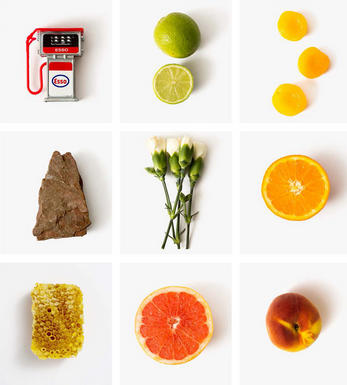
Riesling
Riesling's twin peaks are its intense perfume and its piercing crisp acidity which it manages to retain even at high ripeness levels.
In Germany, Riesling constitutes around 20% of total plantings, yet it is responsible for all its greatest wines. It is planted widely on well-drained, south-facing slate-rich slopes, with the greatest wines coming from the best slopes in the best villages. It produces delicate, racy, nervy and stylish wines that cover a wide spectrum of flavours from steely and bone dry with beautifully scented fruits of apples,apricots, and sometimes peaches, through to the exotically sweet flavours of the great sweet wines.
It is also an important variety in Alsace where it produces slightly earthier, weightier and fuller wines than in Germany. The dry Rieslings can be austere and steely with hints of honey while the Vendages Tardives and Sélection de Grains Nobles are some of the greatest sweet wines in the world.
It is thanks to the New World that Riesling is enjoying a marked renaissance. In Australia the grape has developed a formidable reputation, delivering lime-sherbet fireworks amid the continental climate of Clare Valley an hour's drive north of Adelaide, while Barossa's Eden Valley is cooler still, producing restrained stony lime examples from the elevated granitic landscape; Tasmania is fast becoming their third Riesling mine, combining cool temperatures with high UV levels to deliver stunning prototypes.
New Zealand shares a similar climate, with Riesling and Pinot Gris neck to neck in their bid to be the next big thing after Sauvignon Blanc; perfectly suited is the South Island's Central Otago, with its granitic soils and continental climate, and the pebbly Brightwater area near Nelson. While Australia's Rieslings tend to be full-bodied & dry, the Kiwis are more inclined to be lighter bodied, more ethereal and sometimes off-dry; Alsace plays Mosel if you like.


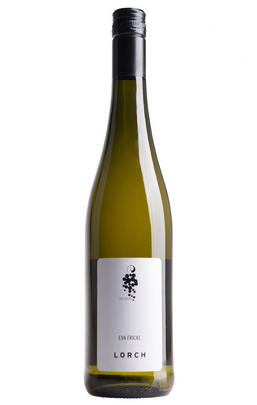
Buying options
Add to wishlist
wine at a glance
Delivery and quality guarantee